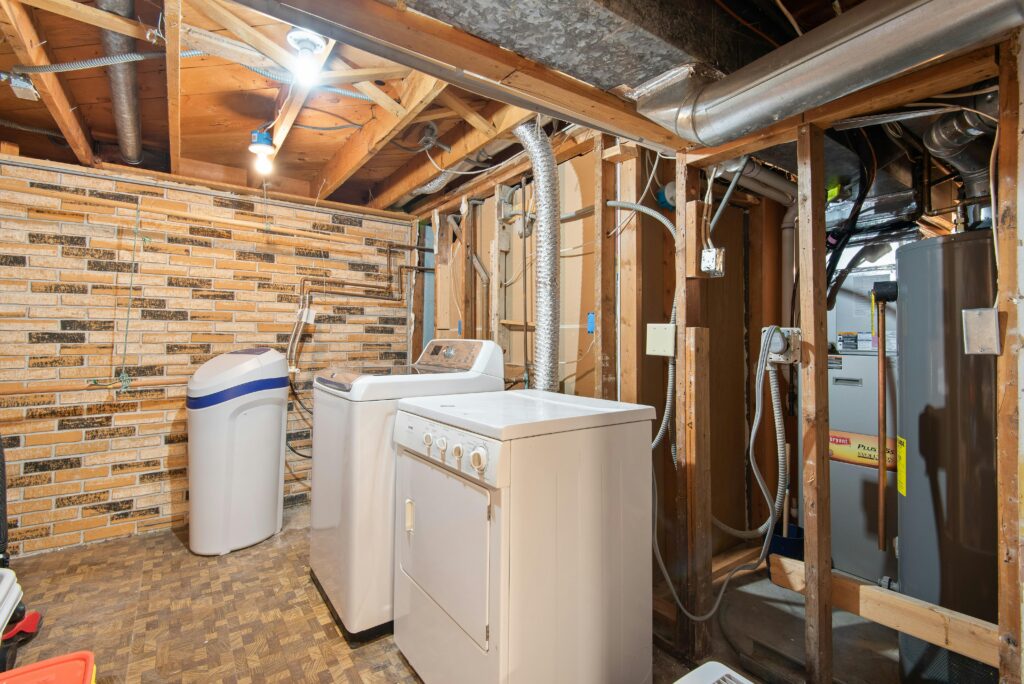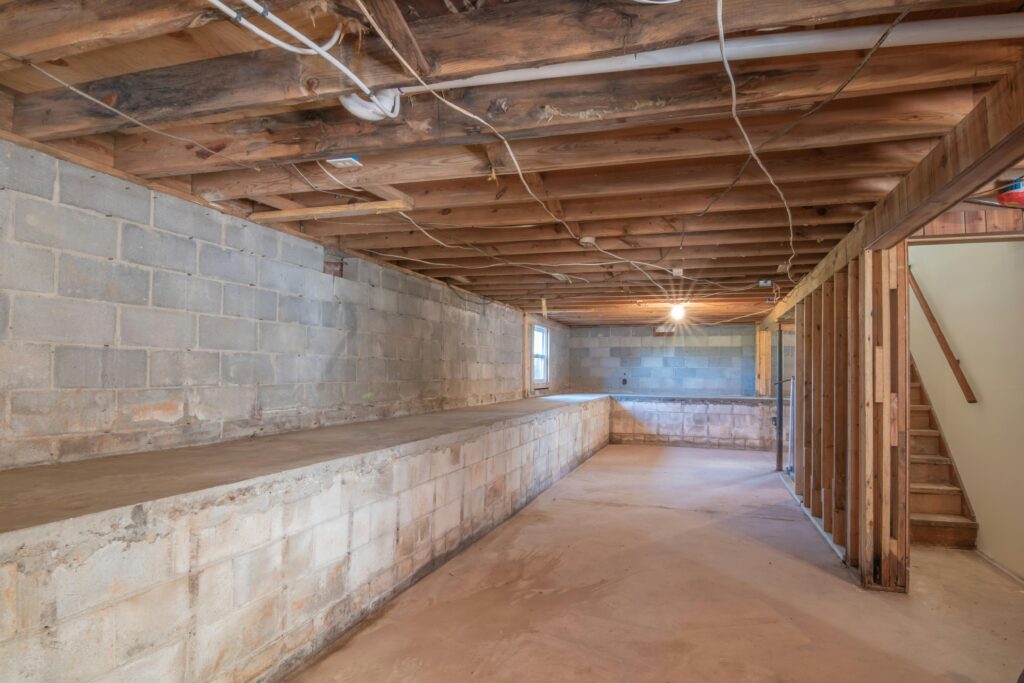Imagine this: You’ve just walked into your home’s basement, a dark, underutilized space crying out for transformation. You envision a cozy family room, a home office, or even a sleek entertainment area. But then reality kicks in, how will you afford the remodeling project? Renovating a basement can breathe new life into your home, but understanding the financial side is crucial to making your dream a reality. That’s where financing your basement remodeling project cost estimates & options come into play.
In this article, you’ll learn how to navigate the often complex world of basement remodeling costs and the various financing options available. We’ll explore how to accurately estimate the budget for your project and discuss practical funding alternatives, from personal loans and home equity lines of credit (HELOCs) to specialized remodeling loans. Whether you’re planning a small refurbish or a full-scale renovation, knowing how to finance your basement remodel effectively can save you stress and money.
By the end of this guide, you’ll feel empowered to make informed decisions about financing your basement remodeling project cost estimates & options. You’ll be equipped with tips to balance your vision with your budget, understanding not just the costs involved but how to secure the funding that makes those costs manageable. Let’s unlock the potential under your feet without breaking the bank.
Table of Contents
ToggleKey Takeaways
- Accurate cost estimates (including a 10–20% contingency) are essential before choosing financing.
- Compare multiple quotes to understand true project scope and budget needs.
- Home equity loans/HELOCs often offer the lowest interest rates for large renovations.
- Personal loans and credit cards can cover smaller expenses but may carry higher rates.
- Cash-out refinancing and FHA 203(k) loans provide alternative funding for major remodels.
- Always evaluate your credit score, debt-to-income ratio, and monthly cash flow before borrowing.
- Shop rates and terms across lenders to secure the most favorable financing option.
- Maintain strict budget oversight during the project to avoid debt overrun.
Why Understanding Financing Your Basement Remodeling Project Cost Estimates & Options Is Crucial for Your Home Upgrade
Embarking on a basement remodeling project is an exciting journey that transforms an often-underutilized space into a vibrant living area, entertainment hub, or even a cozy guest suite. However, before the hammer hits the nail, one vital aspect demands your attention: financing your basement remodeling project cost estimates and options. This element is not just a mundane financial detail; it is the cornerstone that can make or break the success of your renovation endeavor.
What Does Financing Your Basement Remodeling Project Cost Estimates & Options Mean?
At its core, financing your basement remodeling project cost estimates and options refers to the process of assessing the anticipated expenses involved in renovating your basement and exploring the various ways to secure the necessary funds. This involves obtaining detailed cost estimates from contractors, material suppliers, and design professionals and then aligning these costs with financing methods that fit your financial situation.
Understanding this process is essential because basement remodeling costs can vary widely, often ranging from $10,000 to $50,000 or more, depending on the scope and specifics of the project. According to the National Kitchen & Bath Association, homeowners who invest in basement remodels see an average return on investment (ROI) of around 70%, making it a compelling home improvement project but one that requires precise financial planning to maximize benefits.
Why Is It Important to Grasp Financing Options?
Many homeowners start remodeling projects with a vague budget, only to encounter unexpected expenses mid-way that might stall or halt progress. By thoroughly understanding financing options, such as personal loans, home equity lines of credit (HELOC), cash-out refinancing, or even specialized remodeling loans, you can choose a path that provides both affordability and flexibility.
For example, a homeowner named Sarah wanted to convert her unused basement into a rental unit for extra income. By carefully researching and estimating all costs upfront, Sarah realized she needed about $30,000 to complete the job. After comparing financing options, she opted for a HELOC that offered lower interest rates and repayment terms she could handle comfortably. As a result, Sarah completed her remodel on schedule and began generating rental income that fully covered her loan payments within months. Stories like Sarah’s highlight the transformative power of managing financing wisely.
The Broader Benefits of Proper Financing
Investing time in understanding your financing your basement remodeling project cost estimates and options pays dividends beyond just covering the costs. It enables you to:
– Set realistic goals: Knowing your financial limits helps tailor the project scope so that the renovation is feasible and aligns with your vision.
– Avoid debt pitfalls: By choosing the right financing, you protect yourself from high-interest debt and unmanageable payment plans.
– Increase home value: A well-planned and funded basement remodel typically adds significant market value to your property.
– Reduce stress: Financial clarity reduces anxiety during renovation, allowing you to focus on design and creativity.
In summary, financing your basement remodeling project cost estimates and options isn’t merely about money, it’s about empowering yourself to make informed decisions that lead to a successful, rewarding home improvement experience. Understanding the costs and financing pathways ensures that your basement remodel is not just a dream but a practical, achievable reality that enhances your lifestyle and home equity for years to come.
How to Finance Your Basement Remodeling Project: Step-by-Step Guide
Embarking on a basement remodeling project is an exciting venture that can transform your home’s functionality and value. However, financing your basement remodeling project cost estimates and options requires careful planning to ensure you choose the best financial route that fits your budget and goals. Below, we’ll walk you through a comprehensive step-by-step guide to help you strategically finance your basement remodel with confidence.
Step 1: Assess Your Basement Remodeling Cost Estimates
Before exploring financing options, it’s essential to understand the full scope and cost of your basement remodeling project. Start by:
– Gathering multiple quotes: Obtain at least three cost estimates from reputable contractors. Detailed quotes should include materials, labor, permits, and unexpected expenses.
– Breaking down costs: Categorize expenses into major areas such as structural changes, plumbing/electrical work, insulation, flooring, and finishes.
– Considering contingency: Allocate about 10-20% of the total estimate as a contingency fund for unforeseen costs.
Having accurate basement remodeling project cost estimates ensures that you’re financing an amount that reflects the true needs of your project.
Step 2: Evaluate Your Current Financial Situation
Understanding your current finances is key to determining how much funding you need and which financing options suit you best. Consider:
– Savings and liquid assets: Identify how much cash you can allocate without impacting your emergency fund.
– Credit score and debt-to-income ratio: These factors affect loan eligibility and interest rates.
– Monthly income and expenses: Calculate your disposable income to estimate manageable monthly payments.
A clear financial picture helps avoid overborrowing and keeps your basement remodel within sustainable limits.
Step 3: Explore Financing Options Available for Basement Remodeling
Several financing methods can cover your basement remodeling costs. Each option carries different terms and implications:
1. Home Equity Loan or Line of Credit (HELOC)
– Borrow against your home’s equity.
– Lower interest rates than personal loans.
– Interest may be tax-deductible.
– Best if you have significant equity and good credit.
2. Personal Loan
– Unsecured loan with fixed payments.
– Faster approval, no collateral required.
– Typically higher interest rates than home equity options.
3. Credit Cards
– Useful for smaller expenses or quick purchases.
– High-interest rates if balance not paid quickly.
– Avoid if remodeling costs are substantial.
4. Cash-Out Refinance
– Refinance your mortgage for more than you owe and take the difference in cash.
– Potentially lower interest rates; closing costs apply.
– Suitable if mortgage rates have decreased or you want better terms.
5. FHA 203(k) Loan
– Government-backed loan combining purchase and renovation costs.
– Requires meeting certain criteria.
– Great for homebuyers planning basement remodels during purchase.
Step 4: Compare Interest Rates, Terms, and Fees
Once you identify the financing options that fit your profile, compare the details carefully:
– Interest rate type: fixed vs. variable
– Loan term length
– Fees and closing costs
– Prepayment penalties
– Impact on monthly cash flow
Tools like online loan calculators can help estimate monthly payments and total interest paid over time.
Step 5: Apply for the Financing
After choosing the option offering the best balance of cost and flexibility, gather necessary documents such as proof of income, tax returns, credit reports, and basement remodeling cost estimates. Then:
– Submit applications to lenders or financial institutions.
– Respond promptly to any requests for additional information.
– Review loan agreements carefully before signing.
Step 6: Manage Your Basement Remodel Budget Responsibly
Once you secure funding, keep your project finances on track by:
– Monitoring expenses against your initial estimates.
– Reserving your contingency fund for surprises only.
– Avoiding additional debt during the remodeling process.
– Communicating openly with contractors about any budget adjustments.
In Conclusion: Financing your basement remodeling project cost estimates and options doesn’t have to be overwhelming. By thoroughly assessing your costs, understanding your financial position, exploring all available options, and applying careful budgeting, you can fund your basement transformation efficiently and enjoy the comfort and value it adds to your home.

Tips for Financing Your Basement Remodeling Project Cost Estimates & Options:
💰 Create a Detailed Budget: Outline all expected expenses, including materials, labor, permits, and unexpected costs, to avoid surprises.
🔍 Get Multiple Estimates: Obtain quotes from several contractors to compare prices and services, ensuring you get the best value.
🏦 Explore Home Equity Loans: Consider tapping into your home equity as a loan option with potentially lower interest rates.
💳 Use a Renovation Credit Card: If costs are manageable, a credit card with a 0% intro APR on purchases can help spread payments.
📄 Check for Government Grants or Incentives: Research if local or federal programs offer financial assistance for home improvements.
🧾 Plan for Contingencies: Set aside at least 10-15% of your budget for unexpected expenses during remodeling.
📈 Consult a Financial Advisor: Get professional advice to select the best financing option based on your financial health.
🔧 Prioritize Necessary Upgrades: Focus spending on essential areas to enhance property value and avoid overspending on cosmetic features.
Key Concepts
When embarking on the journey of financing your basement remodeling project cost estimates & options, it’s essential to grasp the foundational ideas that govern how remodeling projects are planned, budgeted, and ultimately funded. Remodeling a basement is not merely about construction work; it’s a complex interplay between aesthetics, functionality, materials, and, most critically, the financial blueprint that supports the transformation.
The Nature of Basement Remodeling Costs
Think of your basement as a blank canvas waiting to be transformed. However, unlike a simple painting, this canvas comes with hidden challenges and opportunities. Basement remodeling costs are not uniform; they behave like shifting sands depending on various factors. There’s the scope of the project, are you converting it into a cozy family room, a rental unit, or a personal gym? Each purpose brings distinct materials, labor intensities, and compliance requirements.
Moreover, underlying structural elements, like moisture barriers, insulation, and electrical wiring, play invisible yet pivotal roles that can inflate or deflate your cost estimates. Much like planting a garden where soil quality secretly influences your choice of plants and fertilizers, the condition of your basement shapes its remodeling demands and costs.
Financing as the Architectural Framework
Financing is, in essence, the unseen architectural framework that enables your remodeling dreams to materialize. Without a clear grasp on financing mechanisms, even the best-laid remodeling designs risk remaining on paper. Financing acts as a bridge connecting your current financial state with the future value and enjoyment of your remodeled basement.
Options for financing basement remodeling projects are varied and flexible, much like the selection of tools in a craftsman’s toolbox. These options range from personal savings to loans, credit lines, or even home equity products. Each financing choice carries its own blend of interest rates, repayment terms, and risk profiles, attributes that influence not just the final price tag but also your financial comfort and security post-renovation.
The Crucial Role of Accurate Cost Estimates
Accurate cost estimates are the compass guiding the ship of your remodeling project through the waters of unpredictability. Misestimating costs can liken your project to sailing without a map, vulnerable to sudden storms of hidden fees, structural complications, or unexpected material price hikes.
Cost estimates involve more than compiling prices. They encompass contingency planning (accounting for unforeseen expenses), labor cost fluctuations, local material availability, and even the economic climate. Picture a chess player strategizing several moves ahead; precise cost estimates prepare homeowners for the financial gambits their remodeling project may encounter.
Emotional and Financial Balancing Acts
An often-overlooked concept in financing basement remodeling projects is the emotional interplay tied to financial decision-making. Remodeling a basement is frequently motivated by dreams – creating spaces for family memories, boosting home value, or improving living quality. These emotional drivers influence how flexible or conservative one might be with cost estimates and financing options.
Striking a balance between heartfelt aspirations and pragmatic budgeting requires acknowledging the psychological impact of spending on long-term projects. The emotional weight can sometimes lead to underestimating true costs or overcommitting financially. Recognizing this dynamic helps in aligning financing choices with realistic cost projections and personal financial health.
Investment Value and Return on Investment (ROI)
Financing your basement remodeling project isn’t solely about the immediate costs; it’s about understanding the project’s potential as an investment. Your remodeled basement contributes to your home’s overall market value and can provide tangible returns in future sale prices or rental income.
Considering remodeling through the lens of ROI transforms your cost estimates and financing options from mere expenses to strategic financial moves. Like planting fruit trees that take years to bear fruit, basement renovations require upfront investment but promise increased home equity and lifestyle benefits over time.
Conclusion: The Interwoven Fabric of Remodeling Finance Concepts
In summary, the realm of financing basement remodeling projects cost estimates & options is a tapestry woven with threads of cost complexity, financing diversity, estimate precision, emotional intelligence, and investment foresight. Each thread is crucial for painting a complete picture that empowers homeowners to navigate the often complex financial landscape of basement remodeling with confidence and clarity.
By embracing these core concepts, one can move beyond seeing basement remodeling merely as construction work and perceive it as a financially informed, deeply personal, and highly strategic endeavor that shapes not just physical space, but future possibilities.
Frequently Asked Questions (FAQs) about Financing Your Basement Remodeling Project Cost Estimates & Options
❓ What are the typical costs involved in a basement remodeling project?
Basement remodeling costs vary widely depending on the project’s scope, materials, and finishes. On average, homeowners spend between $20,000 and $50,000. This range can increase for high-end finishes or complex structural work. Getting a detailed cost estimate upfront helps plan your budget effectively.
❓ What financing options are available for basement remodeling projects?
There are several financing options to consider, including home equity loans, personal loans, credit cards, and specialized renovation loans like FHA 203(k). Each option has different interest rates and repayment terms, so it’s important to compare them to find the best fit for your financial situation.
❓ Can I finance my basement remodel through a home equity loan?
Yes, home equity loans are popular for financing home renovations because they typically offer lower interest rates compared to personal loans. They use your home as collateral, which can lead to tax benefits as well. However, it’s essential to ensure you can meet the repayment obligations to avoid risking your home.
❓ Is it better to save up or finance the cost of a basement remodel?
Saving money before starting a remodel avoids interest payments and debt but can delay your project. Financing allows you to proceed immediately but comes with additional costs over time. Balancing your financial health and remodeling urgency is key to deciding the best approach.
❓ How can I get accurate cost estimates for my basement remodeling?
To get precise cost estimates, work with professional contractors who can assess your basement’s condition and understand your design goals. Request detailed quotes that break down labor, materials, permits, and any contingencies. This transparency helps avoid surprises during the remodel.
—
By understanding financing options and getting clear cost estimates, you’ll be better equipped to plan and execute your basement remodeling project with confidence.


